|
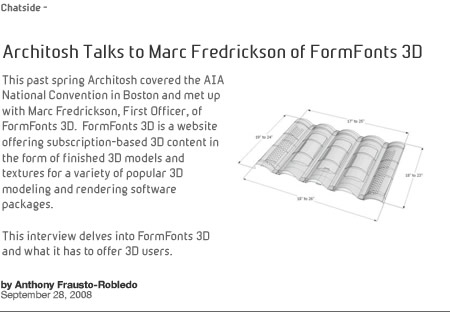
continued
from page 2 <
(MF):
It's still SketchUp, but we're seeing a real shift to other file types
as well.
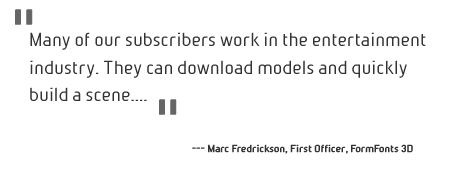
Can
you explain why some of your most popular 3D models
are fully completed and textured skyscrapers
and such?
(MF):
Many of our subscribers work in the entertainment
industry. Production designers love our site.
They can download models and quickly build a
scene, a scene that may need readymade suburban
homes or downtown skyscrapers. One
film production designer has told us that he'll
be on location downloading models into a scene.
We
also have comic book artists who subscribe.
The FormFonts models are used to create the
background in SketchUp. The background is made
quickly and with accurate perspective. The
artist chooses their perspective, and then the
background
image is taken over to Photoshop or printed
out and used on a light box. The artist then
uses
the background image as a template upon which
to draw using their own style.
You
have 3D objects representing real manufactured
objects. Are these executed through partnerships
and if so how are they established?
(MF):
We're working with a number of manufacturers
to develop their 3D product catalogs. We've
built lighting catalogs as 3D models for Prandina,
an Italian lighting company. VODE lighting of Sonoma,
California, has links on their website to FormFonts.
A potential customer of VODE can download their
models
for free. Another manufacturer is O'Hagin's
Vents who we've recently started working
with.
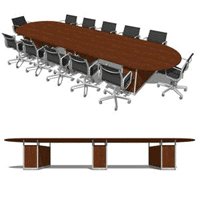 |
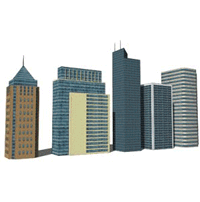 |
| image
01: sample of furniture 3d model components,
fully textured with high-quality woods, metals
and leather. |
image
02: sample of skyline tower objects. Such models
are popular with game developers, artists and
non-AEC professionals for a wide variety of
reasons. |
We
are also currently in discussion with several
major BPMs (Building Product Manufacturers On
the FormFonts website you'll see many manufacturers
represented. Often manufacturers see their product
model on our site and then upon the manufacturer's
request, we will gladly place a link from their
model
on FormFonts to the manufacturers' website.
This typically results in our being hired to
make the full virtual product catalog.
How
popular are you material textures? And do you have
any real manufactured representations?
(MF): On
average there are about 1/10 the number of material
textures downloaded as models. The tile-able
material textures have things like tile, rock,
granite, grass and etc. We have 2D pictures of
real people and tree lines. We are just starting
to work with manufactures on providing material
textures.
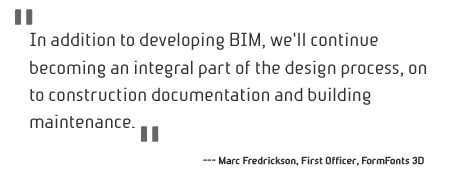
Can
you explain how your service works? What is the
best arrangement for the individual and what
is the best arrangement for the small or mid-sized
architecture firm?
(MF): FormFonts
is a subscription service. An individual person
pays $199 a year and can download up to
30 models and 30 textures a day. We ask that
companies subscribe to as many FormFonts subscriptions
as they have people using the content. Each person
needs their own named subscription. A small company
can either sign up for multiple individual seats
or a corporate account. The corporate account
increases the limit of models and textures downloaded
each day, gives the company the ability to uploaded
their own content along side that of the FormFonts'
content -- only the company can see their own
content -- and the
corporate account has what we call P-MOD. It
stands for Priority Modeling On-Demand. .
What
is P-MOD or Priority Modeling On-Demand? Who uses
that?
(MF): P-MOD
stands for Priority Modeling on Demand. It is
an upgrade from our content request service.
Subscribers can request that we make a model
or texture. We try our best to fulfill the request
in a timely manner, but there's no guarantee.
With P-MOD we guarantee that the model will be
delivered within 72 hours.
Are
there many corporate accounts using the private
mode to have you guys host their models up on FormFonts?
(MF): We
have a few, but I wouldn't say many. The issue
is that finding and organizing content and properly
adding metadata, et cetera, is a non-trivial
undertaking.
What
does the future hold for FormFonts 3D? Where do
you want to take the service?
(MF): Before,
when I talked about the polymorphic idea behind
FormFonts I mentioned BIM and rendering styles. In addition to developing
BIM, we'll continue becoming an integral part
of the design process,
on to construction documentation and building
maintenance. As the virtual world becomes more
like the real world you'll see FormFonts
be part of it from AEC to entertainment.
Thanks
Marc for talking to Architosh about FormFonts 3D.
(MF): Thanks
for the opportunity.
pages:
| 1 | 2 | 3 |
Reader Feedback: Talk to us:
|






![]()
![]()